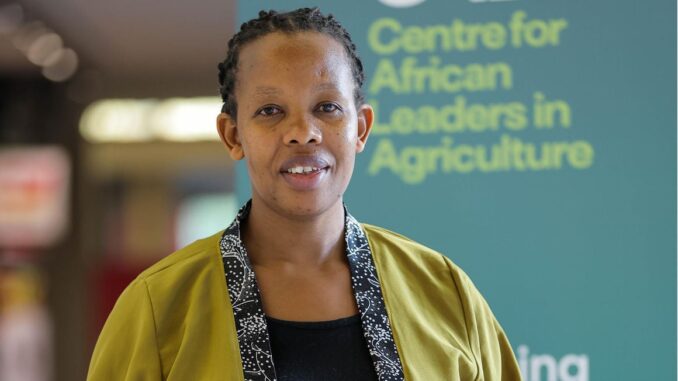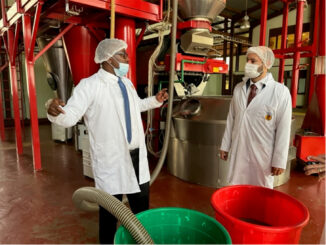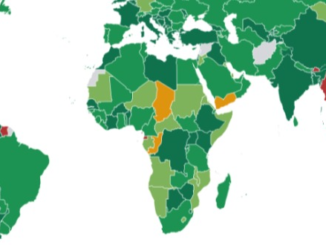
Rwanda’s agriculture sector grew by five percent annually over the past 15 years as the country’s GDP rose from $441 in 2007 to $1,004 in 2022.
Agriculture was one of the key factors that drove down poverty from 60 percent in 2000 to 38.2 percent in 2017.
The soft underbelly of this solid success, however, is that over 20 percent of Rwanda’s population is food insecure. Food shortages, coupled with international dynamics, have seen Rwanda’s food inflation skyrocket to third highest in the world.
Flooding, irregular rains and poor farming methods detract from the great strides the country is making to entrench agriculture as a viable economic activity.
Read: Africa losing $952bn every year to ‘hidden food cost’
Additionally, Rwanda’s farming prospects are also negatively affected by the fragmented nature of arable land: Rwanda is a densely populated nation.
Rwanda’s farming challenges mirror those in parts of the region, where young people shun agriculture in preference for white-collar jobs in urban areas, but they also underline the untapped potential of the sector.
For example, the cattle population has grown from one million in 2005 to around 1.5 million in 2022, with a contribution of over 450,000 cows from the Girinka programme initiated by the government in 2006.
The increase in animal population boosted animal products in the country and thus contributed to the improvement of livelihoods, nutrition, family incomes and social cohesion among Rwandans. Milk production has increased from 142,511 metric tonnes in 2005 to 999,976 metric tonnes in 2022. Farming employs more than 70 percent of the country’s population.
Agriculture is an important source of foreign exchange for Rwanda, making up 37 percent of the value of the country’s exports in the 2021-2022 fiscal year while income from agriculture exports increased from $70 million before 1994 to $640 million in 2023. Only coffee, tea, and pyrethrum were considered as cash crops, but staple crops, animal products, new commodities like macadamia, flowers, fruits, vegetables, cereals, and grains are now also considered as cash commodities.
Read: Rwanda gets $107m EU aid as food insecurity spirals
Annual tea production grew from 11,000 metric tonnes of made tea in 1994 to 38,361 metric tonnes of made tea to date. Annual tea revenue was only $17.5 million 29 years ago, but this cash crop now generates $106 million and it is exported to many countries among which are Pakistan, UK, Kazakhstan, Sudan, Egypt, Ireland, and Germany. In the same period, annual coffee income has increased from $38 million to over $105 million today.
Solange Teta, a soil conservation graduate and director-general of Youth Empowerment at the Ministry of Youth and Culture, says: “I love taking care of the land and helping young people become part of farming.
“Many young people are now interested in farming because we are moving from old ways to modern farming,” she says, because, across the country, youth are trying out new and better ways to grow crops and start businesses with the food they produce.
Rwanda’s young population is increasingly attracted to farming, and their mindsets are changing because of the efforts of individuals like Ms Teta, who have undergone training at the Centre for African Leaders in Agriculture (Cala). These leaders in turn champion the introduction of modern farming skills and knowledge in the country.
Ms Teta is optimistic that Rwanda can meet her food needs by drawing more young people into modern farming.
Africa’s food security challenges require results-oriented leaders in government, the private sector and civil society who are responsive, adaptable, and able to lead collaboration, mobilize real change, and ensure delivery of country priorities.
Read: Why EA must look inward to address food insecurity
For a leader and champion in food security and agriculture to remain relevant and effective in their country, they need to be professionally ready to lead change and deliver on their priorities with practical tools and strategies.
Francois Nsengiyumva, managing director of Kilimo General Business, who is also an alumnus of Cala, is making similar impact in agri-business.
“I’ve always been in farming since my childhood, I needed to upgrade my skills because technology is always changing, and Cala was instrumental in providing me with the knowledge and tools to modernise my farming practices.”
He learned about sustainable farming practices, market linkages, and leadership skills, all of which have been critical in running his business.
Agnes Kalibata, president of Agra, commends the work of young leaders in agriculture.
“Achieving Africa’s food security and economic growth requires leaders who are responsive, adaptable and collaborative, while also integrating new strategies for environmentally sustainable agriculture,” she said.



